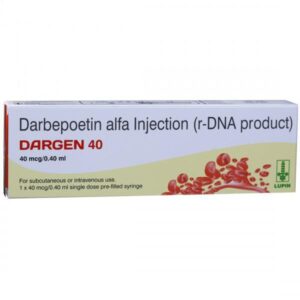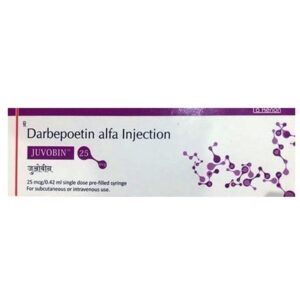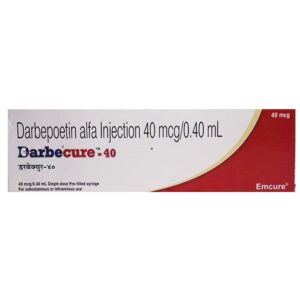DARBEPOETIN ALPHA
DARBEPOETIN ALPHA: DARBEPOETIN ALPHA is a medication commonly prescribed for the treatment of anemia associated with chronic kidney disease, chemotherapy-related anemia, and anemia caused by certain HIV medications. It belongs to a class of drugs called erythropoiesis-stimulating agents (ESAs).
The main mechanism of action of DARBEPOETIN ALPHA is to stimulate the production of red blood cells in the bone marrow. It works by binding to and activating the erythropoietin receptor, which leads to an increased production of red blood cells. This helps to improve anemia by increasing the total red blood cell count and improving the oxygen-carrying capacity of the blood.
The dosage of DARBEPOETIN ALPHA varies depending on the patient’s condition and their response to the treatment. It is usually administered as an injection under the skin or into a vein. The frequency of administration may range from once a week to every 4 weeks, and the dose is determined by the healthcare provider based on the patient’s hemoglobin levels.
As with any medication, DARBEPOETIN ALPHA can have side effects. Common side effects may include headache, dizziness, injection site reactions (such as redness, itching, or pain), nausea, vomiting, diarrhea, and joint pain. Some patients may also experience high blood pressure, increased risk of blood clots, seizures, or allergic reactions. It is important to inform the healthcare provider if any side effects occur.
DARBEPOETIN ALPHA should be used with caution in patients with uncontrolled high blood pressure, history of blood clots, or known hypersensitivity to ESAs. It is not recommended for use in patients with uncontrolled hypertension or pure red cell aplasia.
Overall, DARBEPOETIN ALPHA is an effective treatment option for anemia associated with various medical conditions. However, it is essential to follow the prescribed dosage and monitor for any possible side effects.



